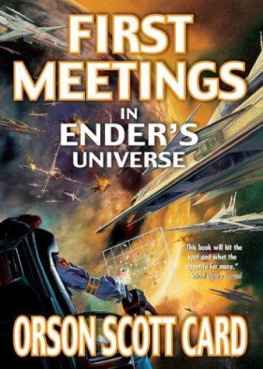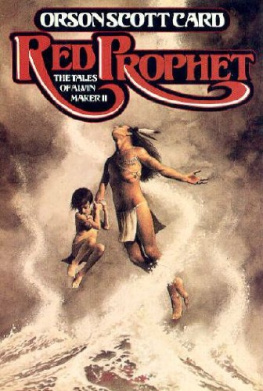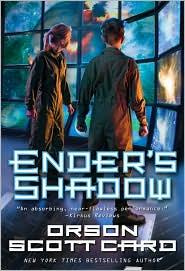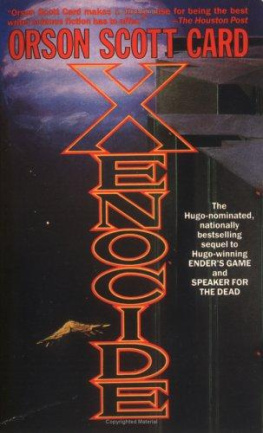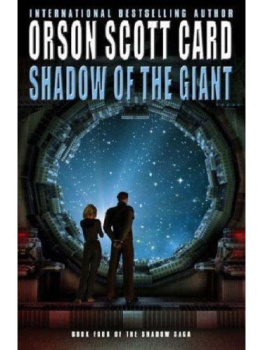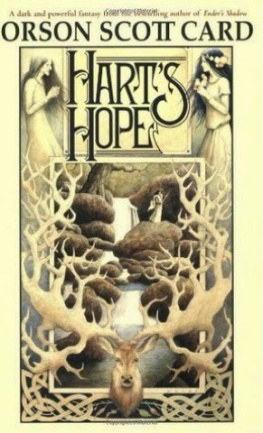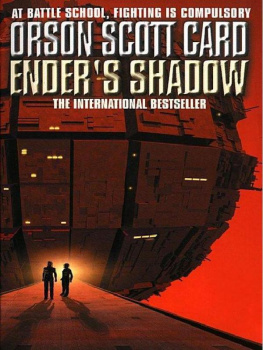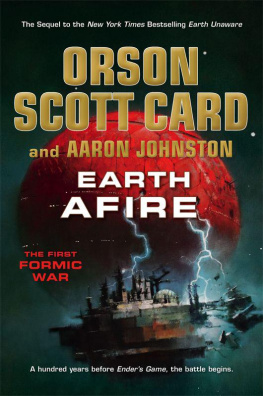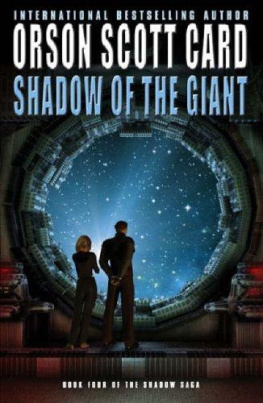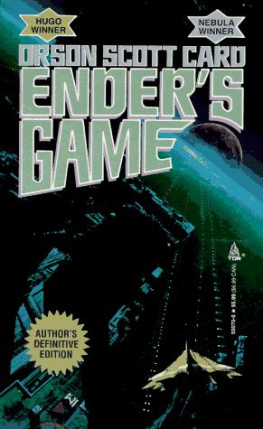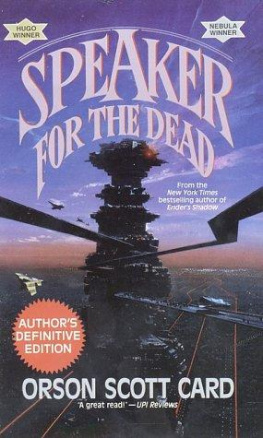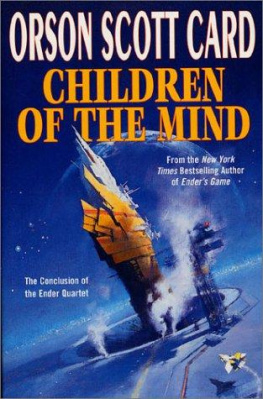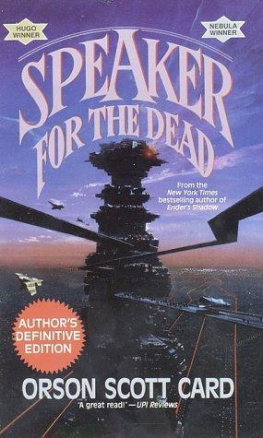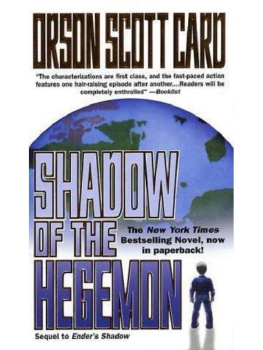THE POLISH BOY
John Paul hated school. His Mother did her best, but how could shepossibly teach anything to him when she had eight other childrensix of them toteach, two of them to tend because they were mere babies?
What John Paul hated most was the way she kept teaching him things he alreadyknew. She would assign him to make his letters, practicing them over and overwhile she taught interesting things to the older kids. So John Paul did hisbest to make sense of the jumble of information he caught from herconversations with them. Smatterings of geographyhe learned the names ofdozens of nations and their capitals but wasn't quite sure what a nation was.Bits of mathematicsshe taught polynomials over and over to Anna because shedidn't even seem to try to understand, but it enabled John Paul to learnthe operation. But he learned it like a machine, having no notion what itactually meant.
Nor could he ask. When he tried, Mother would get impatient and tellhim that he would learn these things in due time, but he should concentrate onhis own lessons now.
His own lessons? He wasn't getting any lessons, just boring tasks thatalmost made him crazy with impatience. Didn't she realize that he could alreadyread and write as well as any of his older siblings? She made him recite from aprimer, when he was perfectly capable of reading any book in the house. Hetried to tell her, I can read that one, Mother. But she onlyanswered, John Paul, that's playing. I want you to learn realreading.
Maybe if he didn't turn the pages of the grown-upbooks so quickly, she would realize that he was actually reading. But when hewas interested in a book, he couldn't bear to slow down just to impress Mother.What did his reading have to do with her? It was his own. The only part ofschool that he enjoyed.
You're never going to stay up with your lessons, she saidmore than once, if you keep spending your reading time with these bigbooks. Look, they don't even have pictures, why do you insist on playing withthem?
He's not playing, said Andrew, who was twelve. He'sreading.
Yes, yes, I should be more patient and play along, saidMother, but I don't have time to... And then one of the babiescried and the conversation was over.
Outside on the street, other children walked to schoolwearing school uniforms, laughing and jostling each other. Andrew explained itto him. They go to school in a big building. Hundreds of them in the sameschool.
John Paul was aghast. "Why don't their ownmothers teach them? How can they learn anything with
hundreds?"
There's more than one teacher, silly. A teacherfor every ten or fifteen of them. But they're all the same age, all learningthe same thing in each class. So the teacher spends the whole day on theirlessons instead of having to go from age to age.
John Paul thought a moment.And every age has its own teacher? And the teachers don'thave to feed babies and change their diapers. They have time to reallyteach. But what good would that have done for John Paul? They would haveput him in a class with other
five-year-olds and made him read stupid primers all dayand he wouldn'tbe able to listen to the teacher giving lessons to the ten- and twelve- andfourteen-year-olds, so he really would lose his mind.
It's like heaven, said Andrew bitterly. And if Fatherand Mother had had only two children, they could have gone there. But theminute Anna was born, we were cited for noncompliance. John Paul wastired of hearing that word without understanding it. What isnoncompliance? There's this great big war out in space, saidAndrew. Way above the sky.
I know what spaceis, said John Paul impatiently. OK, well, big war and all, so allthe countries of the world have to work together and pay to build hundreds andhundreds of starships, so they put somebody called the Hegemon in charge of thewhole world. And the Hegemon says we can't afford the problems caused byoverpopulation, so any marriage that has more than two children isnoncompliant.
Andrew stopped as if hethought that made everything clear. But lots of families have more thantwo kids, said John Paul. Half their neighbors did. Because this isPoland, said Andrew, and we're Catholic. What, does thepriest give people extra babies? John Paul couldn't see the connection."Catholics believe you should have as many children as God sends you. Andno government has the
right to tell you to rejectGod's gifts. What gifts? said John Paul. You,dummy, said Andrew. You're God's gift number seven in this house.And the babies are gift
eight and gift nine. But what does it haveto do with going to school? Andrew rolled his eyes. You really aredumb, he said. Schools are run by the government. The
government has to enforce sanctions against noncompliance. And one ofthe sanctions is, only the first two children in a family have a right to go toschool. But Peter and Catherine don't go to school," said JohnPaul.
Because Father and Mother don't want them to learn all theanti-Catholic things the schools teach.
John Paul wanted to ask what anti-Catholic meant, but thenhe realized it must mean something like against-the-Catholics so it wasn'tworth asking and having Andrew call him a dummy again.
Instead he thought and thought about it. How a war made it so all thenations gave power to one man, and that one man then told everybody how manychildren they could have, and all the extra children were kept out of school.That was actually a benefit, wasn't it? Not to go to school? How would JohnPaul have learned anything, if he hadn't been in the same room with Annaand Andrew and Peter and Catherine and Nicholas and Thomas, overhearing theirlessons?
The most puzzling thing was the idea that the schools could teachanti-Catholic stuff. Everybody's Catholic, aren't they? he askedFather once.
In Poland, yes. Or they say they are. And it used to betrue. Father's eyes were closed. His eyes were almost always closed,whenever he sat down. Even when he was eating, he always looked as though hewere about to fall over and sleep. That was because he worked two jobs, thelegal one during the day and the illegal one at night. John Paul almost neversaw him except in the morning, and then Father was too tired to talk and Motherwould shush him.
She shushed him now, even though Father had alreadyanswered him. Don't pester your father with questions, he has importantthings on his mind.
I have nothing on my mind, said Father wearily. Ihave no mind.
Anyway, said Mother.
But John Paul had another question, and he had to ask it. Ifeverybody's Catholic, why do the schools teach anti-Catholic?
Father looked at him like he was crazy. How old are you?
He must not have understood what John Paul was asking, since it hadnothing to do with ages. I'm five, Father, don't you remember? But why dothe schools teach anti-Catholic?
Father turned to Mother. He's only five, why are you teaching himthis?
You taught him, said Mother. Always ranting about thegovernment.
It's not our government, it's a military occupation. Just onemore attempt to extinguish Poland.
Yes, keep talking, that's how you'll get cited again and you'lllose your job and then what will we do?
It was obvious John Paul wasn't going to get any answer and he gave up,saving the question for later, when he got more information and could connectit together.

